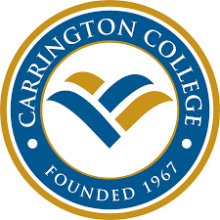Carrington College - Phoenix


Selected Programs at Carrington College - Phoenix
Explore programs at Carrington College - Phoenix. This list is curated by SkillPointe to match skills-based industries and careers that don't require a four-year degree.
Browse Training Programs (18)
Electrician
Electrician Technology A.A.S.
Students in our Electrical Technology program will study and master the basic principles, applications, concepts and functions of electrical circuitry...
View Program
Electrician Technology Certificate Program
Students in our Electrical Technology program will study and master the basic principles, applications, concepts and functions of electrical circuitry...
View Program
HVAC Technician
HVAC-R A.A.S.
Students study the operation, maintenance, and repair of residential and commercial equipment.
Upon completion of the Heating, Ventilation, Air...
View Program
HVAC-R Certificate Program
Students study the operation, maintenance, and repair of residential and commercial equipment.
Upon completion of the Heating, Ventilation, Air...
View Program
Dental Assistant
Dental Assistant Program A.A.S.
Students in Carrington College’s Dental Assisting program begin with a broad base of knowledge on subjects ranging from anatomy of the head and mouth...
View Program
Dental Assistant Program Certificate Program
Students in Carrington College’s Dental Assisting program begin with a broad base of knowledge on subjects ranging from anatomy of the head and mouth...
View Program
Medical Assistant
Medical Assistant A.A.S.
Upon completion of the Medical Assisting program, graduates will be able to:
Perform clerical functions, bookkeeping functions and process insurance...
View Program
Medical Assistant Certificate Program
Upon completion of the Medical Assisting program, graduates will be able to:
Perform clerical functions, bookkeeping functions and process insurance...
View Program
Medical Records and Health Information Technician
Medical Billing and Coding Certificate Program
Carrington’s Medical Billing and Coding programs train future medical secretaries the specialized skills and knowledge necessary to perform medical...
View Program
Medical Billing and Coding Program A.A.S
Carrington’s Medical Billing and Coding programs train future medical secretaries the specialized skills and knowledge necessary to perform medical...
View Program
Nurse - LPN / LVN
Nursing A.A.S
Carrington’s registered nursing training prepares future nurses to provide health care duties including taking medical histories, recording vital...
View Program
Pharmacy Technician
Pharmacy Technology Program Certificate
Carrington’s Pharmacy Technology program provides both theory and practical training, which enables technicians, upon licensure*, to function as a...
View Program
Respiratory Therapist
Respiratory Care A.A.S
Students training to become respiratory therapists at Carrington College establish a solid base of knowledge and continue on into focused coursework...
View Program
Surgical Technologist
Surgical Technology A.A.S
Surgical technologists assist in surgical operations under the supervision of surgeons, registered nurses, or other surgical personnel. They are...
View Program
Surgical Technology Certificate
Surgical technologists assist in surgical operations under the supervision of surgeons, registered nurses, or other surgical personnel. They are...
View Program
Vet Technician
Veterinary Assisting Certificate Program
Carrington College’s Veterinary Assisting program prepares students for the clinical, lab, and administrative duties required for entry-level...
View Program
Industrial Machinery Mechanic
Maintenance Technician A.A.S.
Students will study and master the basic principles, applications, concepts and functions of hydraulic systems, bearing and seal types, and power...
View Program
Maintenance Technician Certificate Program
Students will study and master the basic principles, applications, concepts and functions of hydraulic systems, bearing and seal types, and power...
View Program
Address
2149 W. Dunlap Ave. Ste 103
Phoenix, AZ 85021
Phoenix, AZ 85021
Phone number
602-427-0722